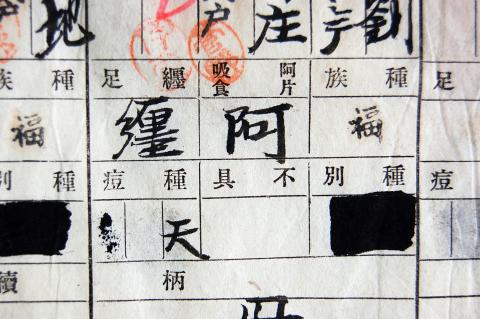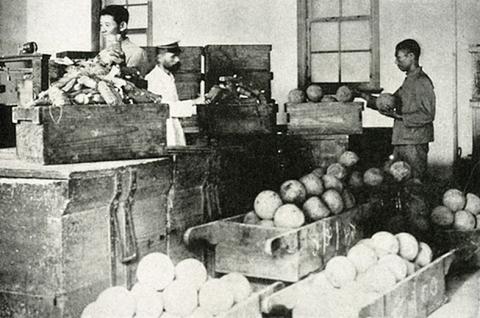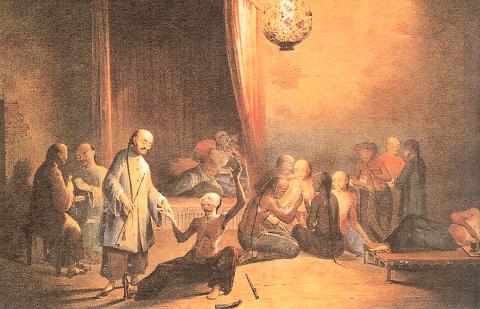Jan. 15 to Jan. 22
Japanese prime minister Ito Hirobumi declared war on opium in Taiwan on April 10, 1895, declaring that the colonial government would be able to “quickly eradicate” the widespread vice in their soon-to-be-acquired territory.
That day was the fourth negotiation between the Qing and Japanese empires, as Li Hongzhang (李鴻章) made a final attempt to dissuade Japan from taking over Taiwan by emphasizing the long-standing habit among its inhabitants.

Photo: Chen Chin-min, Taipei Times
“There have been people living in Taiwan long before the arrival of opium,” Ito replied. “We will strictly prohibit the import of the drug, and nobody in Taiwan will be able to smoke.”
When Li warned Ito that such measures might lead to unrest, Ito replied, “That will be the Japanese Empire’s responsibility.”
Han Chinese settlers in Taiwan had been smoking opium for centuries by then — a Qing Dynasty report from 1724 condemned the practice, stating that it was a vice that needed to be curbed immediately.

Photo courtesy of Wikimedia Commons
But the habit only became more widespread, especially after the Opium Wars in China, which led to the forced legalization of the drug in 1860. Liu Ming-hsiu (劉明修) writes in the book Ruling Taiwan and its Opium Problem (統治台灣與鴉片問題) that between 1864 and 1881, the amount of legal opium imported into Taiwan each year increased from 59,820kg to 352,843kg. And by 1892, the opium trade accounted for more than half of Taiwan’s total revenue.
During the Japanese invasion of Taiwan, resistance leaders even fabricated a Japanese-issued opium prohibition edict to rally addicts to join their ranks, Liu writes. In response, the government temporarily allowed Taiwanese to continue smoking while making it punishable by death to supply the drug to Japanese troops, and later all Japanese nationals.
After the resistance fell in late 1895, the great debate began between proponents of immediate and gradual prohibition. The immediate prohibition camp was mainly concerned that the opium habit would spread to Japan if not curbed right away.

Photo courtesy of Wikimedia Commons
The gradual camp countered by stating that Japanese were not likely to become addicts because of their proclivity to alcohol, which did not mix well with opium. This claim was widely accepted. They also proposed a government monopoly over the manufacturing and sale of opium. Although the government claimed that it chose this path out of benevolence, Liu writes that the real reasons were to avoid further conflict with Taiwanese and also to boost government revenue.
On Jan. 21, 1897, the Japanese colonial government issued the Taiwan Opium Edict, which established the government monopoly and restricted purchase to “proven addicts” with special licenses, with no new licenses issued. In addition, all vendors and users would have to pay a usage fee to the government. Violators were either sent to jail or fined.
There was no verifiable method to show that one was an addict, and Liu writes that essentially anyone over 20 years old who applied would likely have their license approved.
The process took three years because of continued armed resistance, epidemics and people unwilling to pay the usage fee. When the government declared the process complete and cut off registration, there were 169,064 license holders.
However, Liu writes that while legal opium users decreased over the years, the number of illegal users only increased. In 1908, the government launched a mass raid, arresting more than 17,000 illegal users. However, 15,863 of them were deemed “incurable addicts” and given licenses instead.
It was a lucrative venture for the government, as opium revenue accounted for as high as 46.3 percent of the colony’s total in 1898, according to statistics found in Liu’s book. As the number of legal users dropped, the government tried to export the opium and turn it into morphine. They also increased the prices yearly.
During the 1920s, Taiwan’s intellectual elite accused the government of delaying the eradication process so they could keep making money. After repeated protests, they took the issue to the League of Nations, upon which the government started implementing treatment programs and facilities for addicts.
However, the colonial government never relinquished their monopoly, only ceasing to produce the drug in 1944 when opium poppies were needed to make anesthesia during World War II. And they never stopped selling until June 1945 — just two months before surrender.
Taiwan in Time, a column about Taiwan’s history that is published every Sunday, spotlights important or interesting events around the nation that have anniversaries this week.

Towering high above Taiwan’s capital city at 508 meters, Taipei 101 dominates the skyline. The earthquake-proof skyscraper of steel and glass has captured the imagination of professional rock climber Alex Honnold for more than a decade. Tomorrow morning, he will climb it in his signature free solo style — without ropes or protective equipment. And Netflix will broadcast it — live. The event’s announcement has drawn both excitement and trepidation, as well as some concerns over the ethical implications of attempting such a high-risk endeavor on live broadcast. Many have questioned Honnold’s desire to continues his free-solo climbs now that he’s a

As Taiwan’s second most populous city, Taichung looms large in the electoral map. Taiwanese political commentators describe it — along with neighboring Changhua County — as Taiwan’s “swing states” (搖擺州), which is a curious direct borrowing from American election terminology. In the early post-Martial Law era, Taichung was referred to as a “desert of democracy” because while the Democratic Progressive Party (DPP) was winning elections in the north and south, Taichung remained staunchly loyal to the Chinese Nationalist Party (KMT). That changed over time, but in both Changhua and Taichung, the DPP still suffers from a “one-term curse,” with the

Jan. 26 to Feb. 1 Nearly 90 years after it was last recorded, the Basay language was taught in a classroom for the first time in September last year. Over the following three months, students learned its sounds along with the customs and folktales of the Ketagalan people, who once spoke it across northern Taiwan. Although each Ketagalan settlement had its own language, Basay functioned as a common trade language. By the late 19th century, it had largely fallen out of daily use as speakers shifted to Hoklo (commonly known as Taiwanese), surviving only in fragments remembered by the elderly. In

Lines between cop and criminal get murky in Joe Carnahan’s The Rip, a crime thriller set across one foggy Miami night, starring Matt Damon and Ben Affleck. Damon and Affleck, of course, are so closely associated with Boston — most recently they produced the 2024 heist movie The Instigators there — that a detour to South Florida puts them, a little awkwardly, in an entirely different movie landscape. This is Miami Vice territory or Elmore Leonard Land, not Southie or The Town. In The Rip, they play Miami narcotics officers who come upon a cartel stash house that Lt. Dane Dumars (Damon)